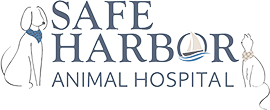What if we told you the key to adding three to five years to your pet’s life is right under their nose? Routine professional dental care at Safe Harbor Animal Hospital is about more than keeping your pet’s pearly whites sparkling—maintaining proper oral hygiene can transform your pet’s health and help them live a longer, more comfortable life.
Now that’s something to smile about.
WHY is dental care important? Periodontal disease affects pet general health
Understanding how periodontal disease can affect your pet’s overall health will help you appreciate the value and importance of routine professional and at-home dental care.
Periodontal disease is the most common preventable disease in dogs and cats—affecting 70% of dogs and 80% of cats by age 3. Every time your pet eats, leftover food debris promotes plaque buildup, which mineralizes and hardens to become visible tartar. Accumulating bacteria then sneak below the gum line and cause inflammation, pain, and infection, and eventual tooth and bone loss.
But the damage doesn’t stop there—as periodontal disease progresses, multiplying bacteria enter the bloodstream and cause kidney, liver, and heart disease.
WHEN will you know dental care is necessary? Be able to recognize disease signs in pets
Every wellness visit at Safe Harbor Animal Hospital includes an oral health assessment of your pet, and our recommendations. But, dental problems can arise between visits, and the best way you can reduce your pet’s periodontal disease progression is by promptly recognizing and addressing the signs, which most commonly include:
- Bad breath
- Red, irritated gums
- Visible brown or yellow tartar
- Broken or chipped teeth
- Bleeding
- Drooling
- Facial swelling
- Changes in eating habits (e.g., dropping food, appetite loss)
- Chewing on one side of the mouth
- Oral sensitivity or pain (e.g., pets may avoid physical contact or cry out when touched)
If your pet is experiencing oral discomfort, professional veterinary care may be necessary, and you should schedule an appointment at Safe Harbor Animal Hospital.
WHAT is a professional dental cleaning? Getting to the root of your pet’s problems
Like your own annual or bi-annual dental cleanings, veterinary dental care is essential for removing plaque and tartar buildup and detecting and addressing oral health problems. At Safe Harbor Animal Hospital, we practice a comprehensive and detailed approach to each oral hygiene procedure or OHP (i.e., dental cleaning under anesthesia). This includes:
- General anesthesia — Anesthesia is necessary to ensure stillness, comfort, and the safety of the pet and our care team. Visit our surgery page for a detailed look at our anesthetic safety measures.
- Full mouth dental X-rays — Digital dental X-rays let us identify hidden pathology below the gum line.
- Oral cavity exam and charting — Our veterinarian evaluates each tooth, and your pet’s gums, palate, jaw, and upper airway for abnormalities.
- Ultrasonic scaling — Ultrasonic scaling uses sound waves to disrupt and break down tartar and plaque above and below the gum line.
- High-speed polishing — Polishing smooths any microgrooves resulting from the scaling process and helps deter plaque bacteria attachment.
- Dental extractions — Tooth removal may sound drastic, but is often the safest, most effective way to resolve a pet’s oral pain and periodontal disease-induced damage.
- Advanced treatments — Conservative (i.e., non-surgical) treatments may be recommended to preserve mildly diseased teeth or slow periodontal disease progression, and may include root planing or antibiotic medication applied below the gum line.
- Pain management — Our proactive approach to pain management includes injectable and oral medications, as well as intraoperative nerve blocks, which not only provide perioperative comfort, but also minimize pain, accelerating your pet’s recovery.
HOW (often) does my pet need a professional cleaning? Follow our recommendations
To protect your pet’s oral health and prevent periodontal disease progression, our Safe Harbor Animal Hospital veterinarians recommend that all pets receive an oral hygiene procedure every 12 months. However, some pets who meet specific criteria may need more frequent cleanings. The criteria include:
- Severe periodontal disease — Pets with established periodontal disease and chronic oral health issues, such as feline stomatitis or gingival hyperplasia, require more frequent professional treatment to prevent disease progression.
- Toy-breed dogs — Because of their small size, toy dogs tend to suffer from more frequent and recurring dental problems.
- Brachycephalic pets — Flat-faced breeds, such as pugs, bulldogs, boxers, and Persian cats, experience many oral health challenges, including dental crowding, malocclusion, and excessive gum tissue, that create an ideal breeding ground for plaque and tartar accumulation.
Like your own dentist visits, more frequent oral hygiene procedures reduce your pet’s likelihood for disease. Routine cleanings are a long-term investment that save your pet from unnecessary pain and suffering, and can save you veterinary expenses.
HOW can I make the most of a professional cleaning? Let us show you the many (simple) ways
How you care for your pet’s teeth between oral hygiene procedures can influence their future health and potentially extend the time between cleanings. Here are five simple ways to protect your investment in your pet’s oral health:
- Brush your pet’s teeth daily
- Feed your pet a dental diet
- Remove hard bones and chew toys that may damage teeth
- Use Veterinary Oral Health Council (VOHC)-approved dental products (e.g., chews, water additives, and treats)
- Monitor your pet’s mouth for periodontal disease signs
Your pet’s oral health is more than meets the eye—or perhaps the nose. Regular examinations and oral hygiene procedures at Safe Harbor Animal Hospital, along with a dedicated home care routine, can help to ensure your pet lives a longer and more comfortable life. Let the Safe Harbor Animal Hospital team guide you and your pet to good dental health and overall wellness—contact our team to schedule an oral health consultation.









Leave A Comment